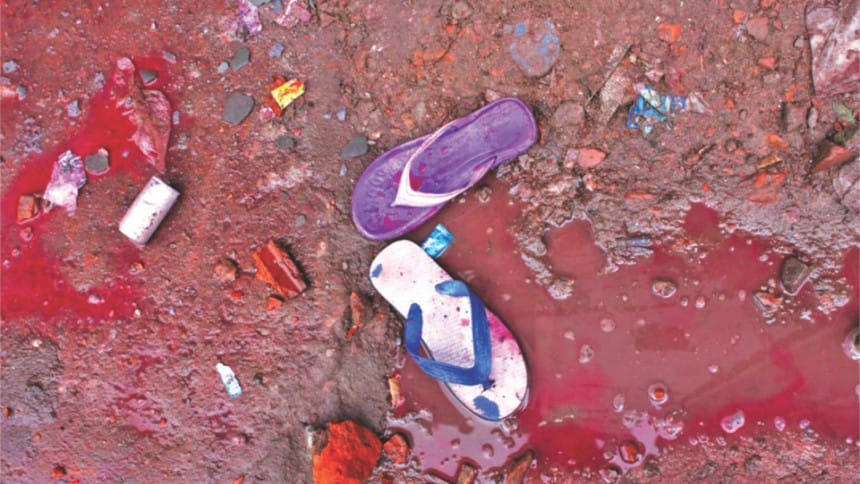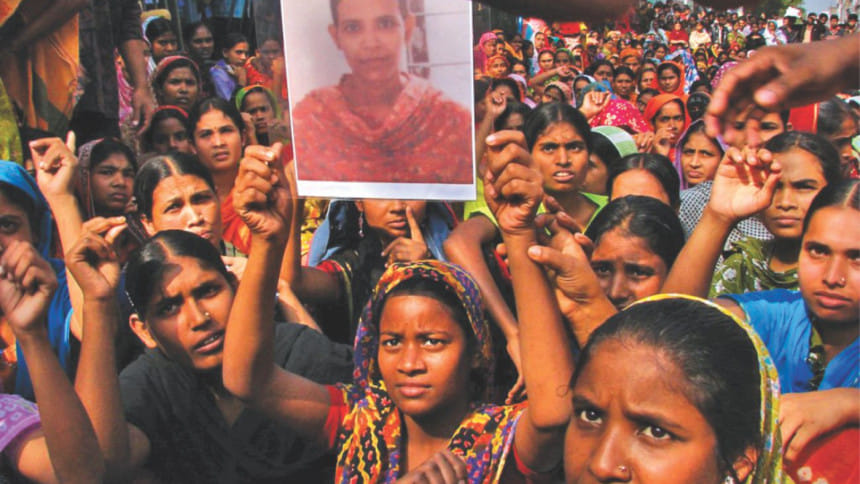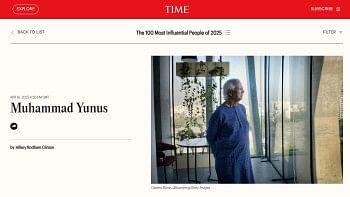Life partners

International Women's Day is entering its 108th year. Debates and discussions inevitably ensue each March about women's long journey through the years. This year, however, I want to introduce you to some of my life partners. These courageous women have been my friends and have slowly but surely been leaving their mark on my own life, changing me for the better. They give me the strength to stand strong, and dream of a better, more egalitarian future.
Women like them are all around us; they continue to contribute to our lives, and to the nation, without any acknowledgement. We remain not so much unaware of their existence but oblivious to them; we refuse to recognise how integral they are in our struggle to become recognised as citizens and humans. These women are not like the “successful” middle-class women we see in mass-media or interact with in our civil society platforms. But to me, these women are no less than heroes. They are the heirs to the women workers in New York who planted the seeds of International Women's Day in 1857, and who, in 1907 and 1910, waged movements against inhumane work conditions, low wages, long work hours and for women's right to vote in New York, Stuttgart, Copenhagen and other places of the world. Yes, readers, the stories I am going to recount today are those of Bangladesh's garment workers.
First, let me introduce you to Seema. I only knew her for a short time, but I have not been able to forget her. It was January 2 or 3, 2008. Seema may have been 19 or 20 at the time. We weren't introduced under normal circumstances. A state of emergency had been declared; there was a climate of fear and uncertainty; there were restrictions on freedom of expression—even activists and political organisers feared expressing themselves freely. Protests and demonstrations were banned. At a time like that, Seema's incredible courage had amazed and moved me. Observing her from afar, and hearing her speak, I had felt goosebumps all over. Seema was wearing a blue kameez. A blue orna, with a thin golden border, covered her head. It was a few days after a worker named Salma had died in a factory in Shewrapara in Mirpur. Seema was her coworker.
On December 30, Salma had fallen sick during night duty but had been refused sick leave by her supervisors. Too sick to work, she had lain down underneath her machine. She passed away next morning after returning home. Workers in her factory, SQ Sweaters Ltd, began to protest, declaring that the management was responsible for her death. Workers from other factories also joined the protest. Soon, the demonstrations evolved into a movement for higher wages. At the time, the minimum wage was BDT 1662 and the number of workers in the RMG sector was around 22 lakh.
Ignoring the state of emergency, workers like Seema had taken to the streets. Flouting the presence of the security forces, and the possibility of threats from factory owners, Seema had taken the microphone in front of thousands of workers. She declared that she wanted justice for her friend Salma's death and for the owners to pay for their negligence. She also said,
“They think we are helpless women. [But] we too have lives. We too work for our livelihoods; we too want to live. We want a life where we can feed and clothe ourselves and live in a decent place… [But] We don't have the right to live. We can't educate our children. We can't rent houses with good environments. There is no value to our lives. We are worthless…

… Garment owners think workers are not people, that we don't have families, that we don't need any benefits or opportunities. When a worker becomes pregnant, she should get three months' leave, but factory owners don't even provide that. They don't even give her the whole month's wages when they force her to resign. We are tortured in the factory and we women are tortured the most. On many occasions, for no reason, I have been slapped and kicked by the supervisions. Is this acceptable? Today in front of everyone I want to say, if our demands are not met, this factory will remain closed. We are citizens of this country. We are your brothers and your sisters. Why won't you listen to our demands? We don't want your wealth; we just want fair wages. We want to live. We will live because we have to. We want to live life to the fullest.” (Mukto shwar, Edition 1, Volume 2, 2008).
Seema's crisp, bold speech brought to the fore the thoughts and desires of all workers. One did not need any more facts to understand what the workers needed and wanted. It was as if her speech was the manifesto of millions of workers. It filled the workers with the resolve to mobilise spontaneously. Workers from other factories joined in the fight.
Since then Seema has stayed away from crowds, but has remained a dear friend in my life, in the deep recesses of my mind, in my struggles and my bleakest moments.
Now, I come to Rahela. She is around 21 or 22 years old. I first met her on June 30, 2010. She worked in Out Right Fashion Ltd factory in Mirpur. A production manager had slapped one of her female coworkers so hard that she had started to bleed. Protesting this beating, workers including Rahela assembled in front of the factory. Just a few days ago, the government had declared BDT 3000 as minimum wage although the workers had demanded a basic of BDT 5000. Although workers had rejected the amount as insufficient, the government had stuck to its decision. From 2008 to 2010, there had been intermittent movements in Ashulia, Savar, Naranganj, Gazipur, Chittagong and other industrial areas. The number of workers in the sector had risen to 3 million by then.
It was the morning of June 30. Rahela—in a blue and purple floral printed salwar kamiz, her hair parted in the middle, adorning a small nose ring and two earrings—had a calm and composed demeanour. At first glance, you could not tell that a turmoil was brewing in her mind, that the scene of her friend's bloodied face had provoked her. Soon, however, the seemingly composed expression of Rahela changed.
The workers had arranged a microphone to speak out about their oppression, but as soon as they started speaking, police charged upon them in an attempt to dissipate them. Many were picked up in police vans. There was panic everywhere. It was then that Rahela turned around. She charged towards the police, and with all her strength, attempted to shield herself and others around her, from the police's baton charges. The police assaulted the impassioned “cheap labour” Rahela, hitting her on the head until she bled. She lost consciousness and fell to the ground.
I was not too far from Rahela. But before I could reach her, the crowd dispersed. Everyone was speaking about Rahela. The next day, the papers printed a photo of Rahela shot by my photographer friend, Andrew Biraj. In one picture, you could see her facing the police; and in the other, her bloodied face. The incident that day and the photos of Rahela in the paper inspired me to great lengths. Women we are used to seeing as helpless victims were rising, unable and unwilling to put up with the status quo any longer. They were beginning to speak up, not only about their low wages but also about the violence against them. I felt a strong urge to speak to Rahela. But, like Seema, I lost Rahela in the crowd too. Since then, I've looked for Rahelas amongst the working and middle classes, who have a strong sense of self-worth, who are preparing not for a day's fight, but a long struggle, who don't give a hoot about the police, local goons and the powers that be. I am convinced that it is women like Rahela who would play the most important role in the movement for democracy and women's emancipation. I remember Rahela, I salute her, and I still wait for millions like her.

The last person I will introduce you to is Polly Akhter. She's around 30 to 35 years old. Lives in a rather rural part of Ashulia towards its furthest end. I've known her for a few years by now. Her older son goes to Class 10 and the other Class 7. Poly herself is ann ordinary worker--not a big organiser of any sort. But she does have plenty of "faults"; she talks back, her vision is failing and her age is catching up with her. She even maintains good relations with labour unions. Because of all these faults she recently lost her job at a big company and has had to recently shift to another.
If you want to truly understand Polly, you need to understand the protests that happened in Ashulia's factories towards the end of 2016 to get the minimum wages raised from BDT 5,300 (USD 63) to BDT 16,000 (USD 192). The movement that was sparked in 2016, spilled over to February 2017, and then took on a different form altogether as the police got involved, local goons attacked the protesters, 1600 workers lost their jobs, and an additional 1500 got sued. The number of garments workers in Bangladesh amount to 44 lakh, of whom 80 percent are women.
It was during this time that the workers of Ashulia were leaving their homes in fear. The police were raiding house after house threatening the families and landlords of those workers who were union organisers. On the other hand, the cops in charge of the industrial zones intensified surveillance in front of the factories. It was in middle of all this that a coalition of 12 trade unions was organising different programmes in Dhaka. Workers from all areas joined in the city centre. The workers of Ashulia came as well—even though they were being kept under watch. They were not too many in number, but it is important to acknowledge them. Every time we had a programme in Dhaka, the police knocked on their doors, threatening them with arrest should they join the demonstrations.
We were holding a demonstration in front the National Press Club on January 13, 2017 to declare solidarity with our colleagues from Ashulia—it was during that event that I met Polly. After the meeting, Polly went home and did something amazing. A union organiser named Labhlu lived close to her home. He too was there with her in Dhaka. The police were on the lookout for Labhlu, so he used to not stay home. On that day however, he happened to be visiting his pregnant wife. At that exact moment, the police knocked on his door. It was nearly 11 pm at night when Labhlu called to inform me about what was happening. I felt so helpless! I probably would not have felt this bad if the police had taken me instead of him. Within a few minutes, Labhlu's phone was switched off—nor could I find any male coworker to go look for him. That is when I called Polly, pleaded with her to get any information on him. I also warned her that she too could get arrested. I thought she would get scared and back out, but the opposite happened instead. Around midnight, she called me saying “I need to thank you. If you had not asked me to step up, I never would have, and then that would have bothered me. The police did not find Labhlu—he is safe in hiding.” Polly went to describe how she took her teenage son and crossed rice fields that late at night to find Labhlu. I was taken aback. This woman risked her own safety to go look for a colleague. Ever since then, Polly has held a big space in my heart. I hail her courage. We became friends—she has not yet gotten lost in the crowds of people we meet.
On this day for women across the world, I have presented to you the stories of Seema, Rahela and Polly. Many like them join the fight to change the lives of women—they become our partners in life. Let us not forget them.
The writer is President, Bangladesh Garment Sramik Samhati and a photographer.





Comments